A huge chapter in the “book of business” at Arbella Insurance Group is coming to a close.
Cofounder John Donohue is stepping down on May 31 from his job as chief executive. He’ll still chair the company’s board and stay active in its charitable work but not its day-to-day operations. The time has finally come to pass the wheel to his long-planned successor, executive vice president Paul Brady.
Donohue’s departure comes after the death in December of cofounder Frank Bellotti, the former state attorney general who was still active at Quincy-based Arbella at age 101. Donohue had worked for Bellotti when he was AG, and the two formed Arbella in 1988 to take over Kemper‘s book of business in Massachusetts. People were skeptical at the time, but Arbella turned out to be a success as it grew in the 1990s by taking over smaller insurers, and kept growing after national players Geico and Progressive drove into the state’s auto market following its deregulation in 2008.
Today, Donohue estimates Arbella collects about $1.2 billion in premiums each year, across four New England states, compared with $200 million at its outset.
While Donohue chaired the Arbella board since the company’s inception, he didn’t step in as chief executive until 2001, taking over for Richard Brewer. Donohue says he’s looking forward to focusing more on Arbella’s foundation, which doles out $2.2 million a year to hundreds of organizations, and that he will be its chief executive, a part-time job.
Donohue has confidence in Brady’s leadership abilities after 12 years of working with him. Brady, who also has a decade of experience at Liberty Mutual, knows how the 1,100-person company is run and has built solid relationships with many of its outside agents. Arbella remains committed to its “independent agent” model, despite the rise of direct, online insurance sales, in part because of the guidance the agents provide to customers.
For Donohue, the final months at Arbella have been a bittersweet time, without Bellotti, his mentor and friend.
“I would sit down and bounce ideas off him and talk strategy … up until the end,” Donohue said. “We got to work together for 44 years. … We always said it was longer than most marriages.”
Final piece for Fan Pier
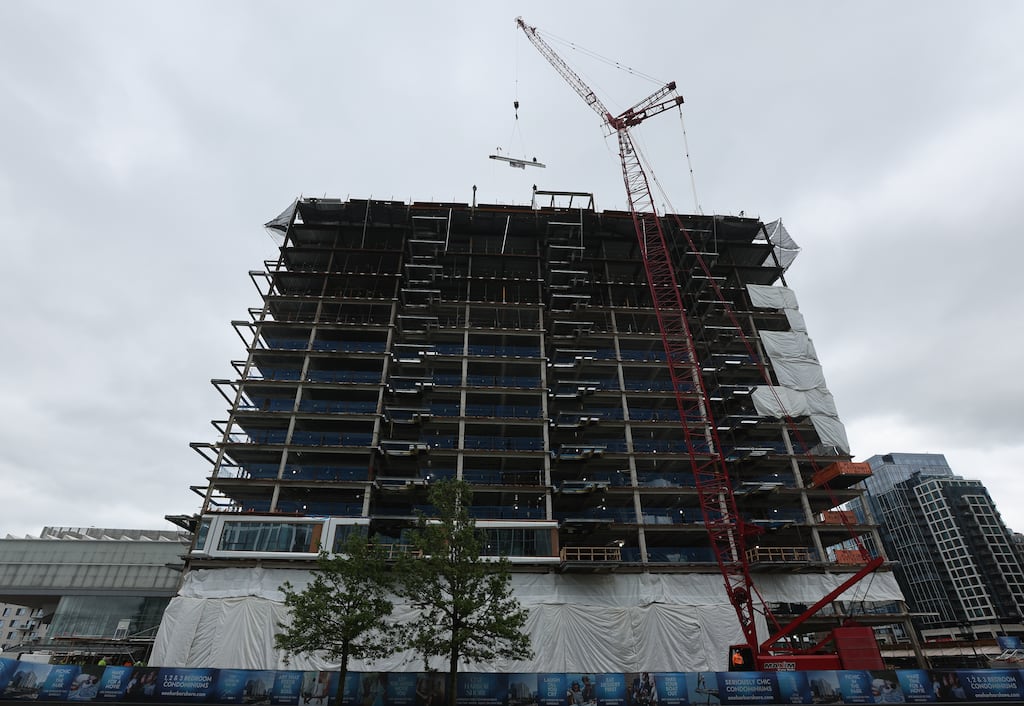
It all started with a helium balloon ride.
Al Vaz, then the head of real estate at Vertex Pharmaceuticals, was visiting Fan Pier nearly two decades ago. At the time, the 21-acre site was not much more than a windswept stretch of parking lots. Developer Joe Fallon‘s namesake firm used the balloon to show off its potential.
Vaz, as Fallon recalls today, called Vertex’s then-chief executive Josh Boger right away. Boger then visited the site and was smitten, too; he eventually inked a deal to bring the biotech and more than 1,000 of its employees to Fan Pier from Cambridge. The move in turn kicked off Fan Pier’s redevelopment, jump-starting the Seaport’s building boom.
Last week, Fallon and colleagues joined the Iron Workers Local 7 and general contractor Turner Construction to help put the final piece of Fan Pier into place in a topping-off ceremony. They raised a steel girder to the top of the 14-story frame of what will be a 122-unit luxury condo project, dubbed “One Harbor Shore.” (Bank OZK provided financing last year, and MassMutual is Fallon’s equity partner.)
When it opens in mid-2026, the building, designed by CBT Architects, will be among the first major privately developed structures in the city to rely almost entirely on electric heat. (Gas fired boilers will kick in when temps get close to zero degrees Fahrenheit.)
Fan Pier now includes the two Vertex towers, the One Marina Park Drive tower where Fallon’s company is located, as well as office buildings for MassMutual and Goodwin. Plus: more than 200 luxury waterfront condos at 22 and 50 Liberty. The Collaborative Companies will start marketing the units at One Harbor Shore in the coming weeks.
“We’re proud of what we have, and we’re proud of what it did for the city,” Fallon said. “This site really became the catalyst for the whole Seaport.”
Banking on Boston’s Pride
Pride parades from New York to San Francisco have lost key sponsors this spring, as companies pull back amid tariff uncertainty and the Trump administration’s assault on corporate diversity and equity programs.
Not in Boston.
One of the leaders hosting Boston’s Pride parade and festival to celebrate the region’s LGBTQ+ community said fund-raising is now on a similar pace to last year, when around $700,000 was raised. So far, the total is in the $600,000 range, with more expected as the June 14 date approaches.
Gary Daffin, of Boston Pride for the People’s executive committee, says nearly half of that amount last year came from corporate sponsorships, and nearly half came from registration fees. (The group is affiliated with the Multicultural AIDS Coalition, where Daffin is the executive director.)
Daffin expects a similar budget this time around. So far, big sponsors are back — a list that includes Delta Air Lines, MFS Investment Management, the Boston Foundation, Beth Israel Lahey Health, Eastern Bank, MassMutual, Rockland Trust, Dana-Farber Cancer Institute, Eversource, and National Grid. Big-ticket corporate sponsorships range from $10,000 to $50,000.
He said a few previous sponsors have not yet committed, but they’re not among the big contributors.
Daffin said the organizers had been concerned that fund-raising could take a hit because of economic uncertainties and the anti-DEI rhetoric in Washington.
“There was a fear that people were not going to reply to our requests,” Daffin said. “But almost everyone who was there last year is back. … It’s a relief, though we still need a little bit more money. We’re not there yet.”
US Chamber to Boston: Be more welcoming
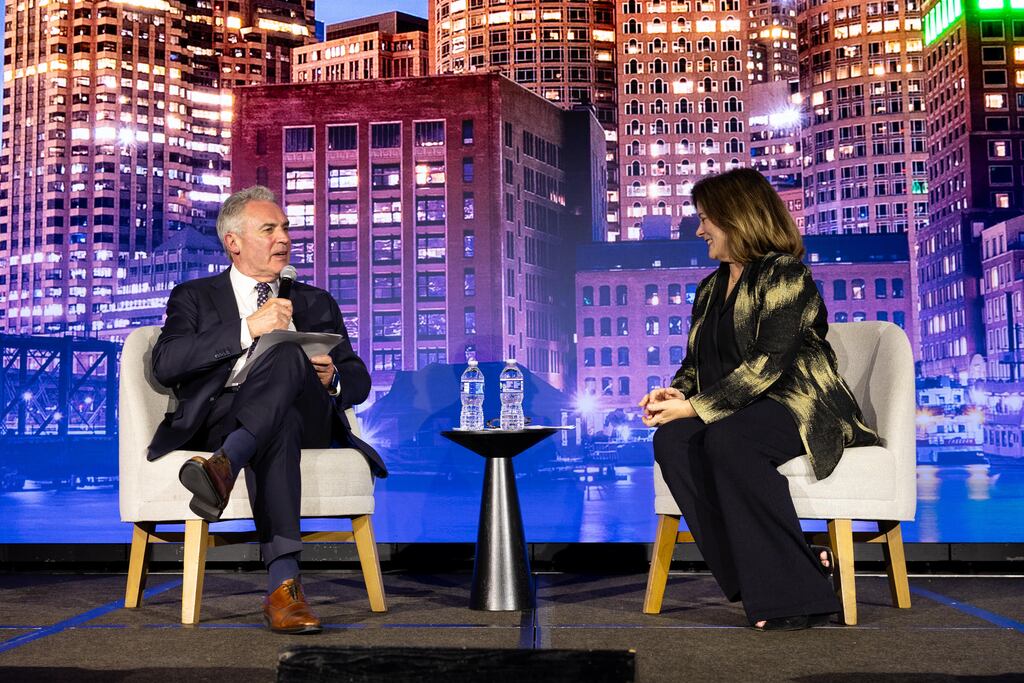
US Chamber of Commerce chief executive Suzanne Clark has some advice for Boston’s business leaders: Don’t be afraid to be more welcoming to outsiders, particularly those with a different viewpoint.
The suggestion emerged after Clark’s speech at the Greater Boston Chamber of Commerce‘s annual meeting, which drew around 1,400 people to the Omni Hotel in the Seaport last week. Greater Boston Chamber chief executive Jim Rooney asked Clark to talk about how Boston and Massachusetts are viewed around the country in terms of competitiveness and business friendliness.
Clark, whose group is more conservative than the Boston chamber, had many good things to say about Boston, praising everything from Fenway Park to the local innovation ecosystem. But her answer to Rooney’s question prompted one of the evening’s few unscripted moments.
“I would say that it’s almost all positive,” Clark said. “[But] there is something going on right now where you have to decide what inclusive means to you, you know? Does diversity include conservative thought? Because there are a lot of people in this country who aren’t sure, right? There’s a lot of conversation about: Would I be welcome in Boston? Would I be welcome at some of the elite institutions? Would my viewpoint be welcome?”
On taxes and deregulation, the US Chamber is in strong alignment with President Trump. But they differ on tariffs, and the chamber recently sent a request to the Trump administration asking for exemptions for small businesses.
Mostly, in her chamber speech, Clark made the case for stoking economic growth, saying that while it can’t solve all of the nation’s problems, it’s tough to solve many of them without that growth.
The chamber also honored its latest set of “Distinguished Bostonians” for contributing to Boston‘s economic and social fabric. Honorees included Jane Steinmetz of Ernst & Young, Michael Curry of the Massachusetts League of Community Health Centers, and Anne Klibanski of Mass General Brigham. The chamber’s previous board chairs, along with current chair Corey Thomas, feted Rooney with a video for his 10 years as chief executive.
And Governor Maura Healey bounded up on stage to provide some encouragement to the business leaders while also making the case why she should be elected again in 2026.
“In a time of crisis, use it as an opportunity,” Healey said. “We proved that 250 years ago when shots rang out by a bridge in Concord and a green in Lexington. That’s Massachusetts. That’s in our DNA. … We’re going to get through this and we’re going to be stronger for it.”
Chestnut Hill Realty’s Ed Zuker wraps up construction at Hancock Village apartmentsBoston’s Vivien Li is feted for a lifetime of environmental workTrillium cofounders raise spirits at Brewers Association annual meeting
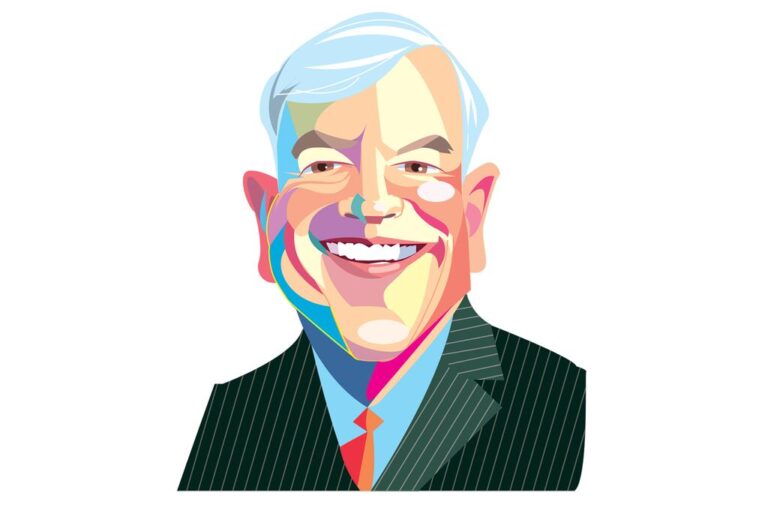
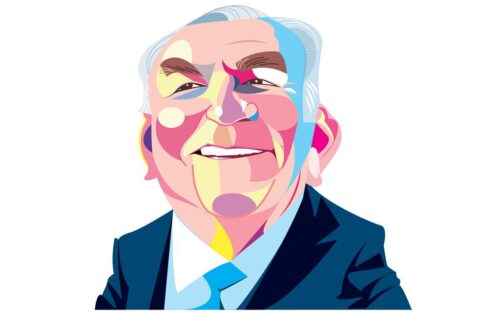
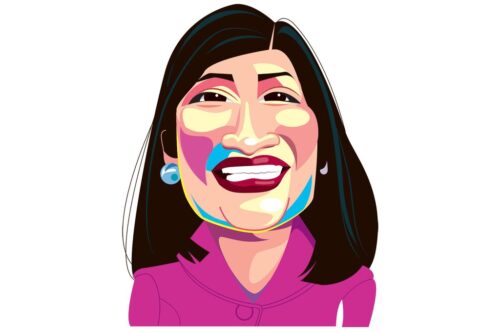
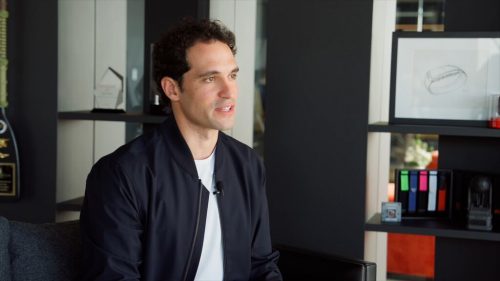
Comment count: